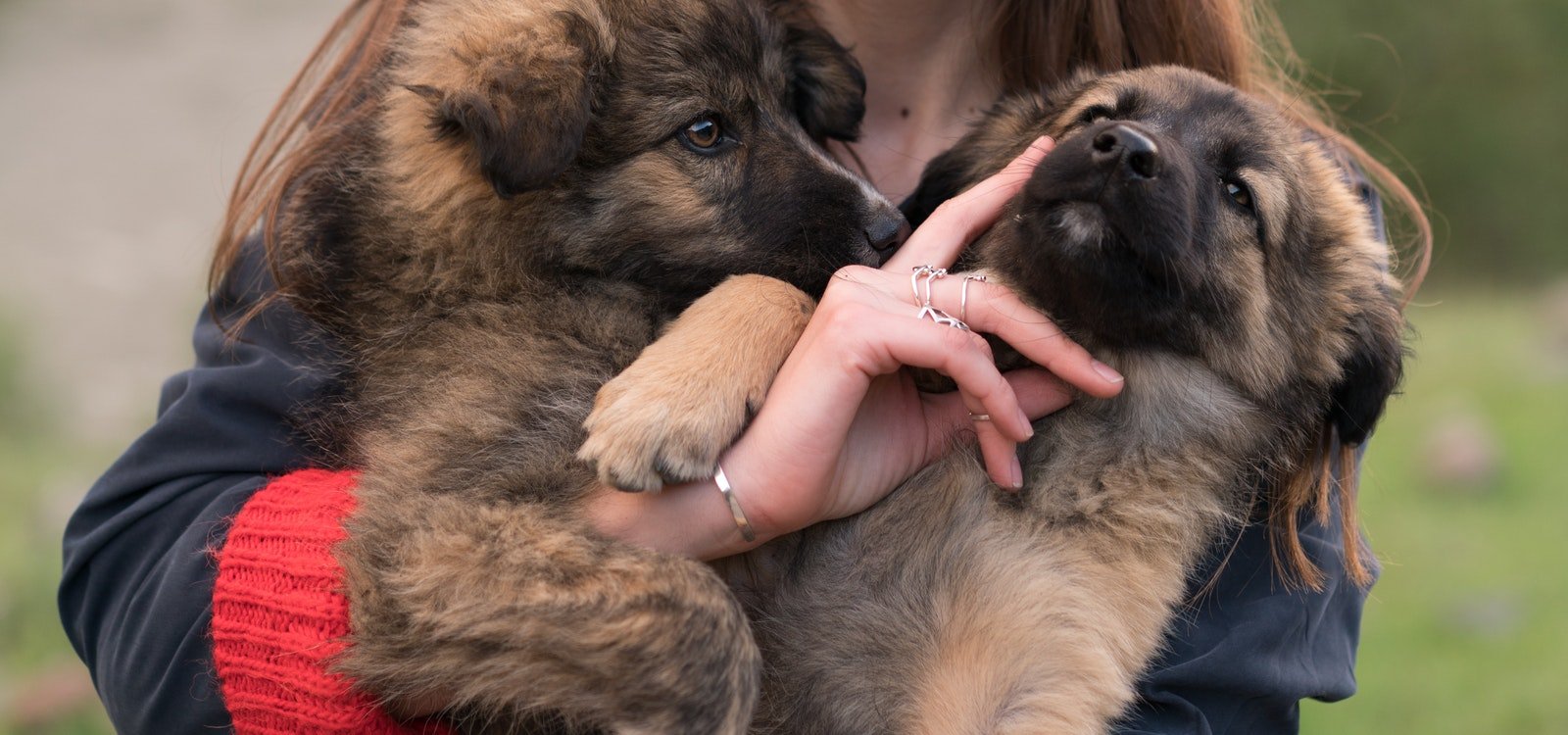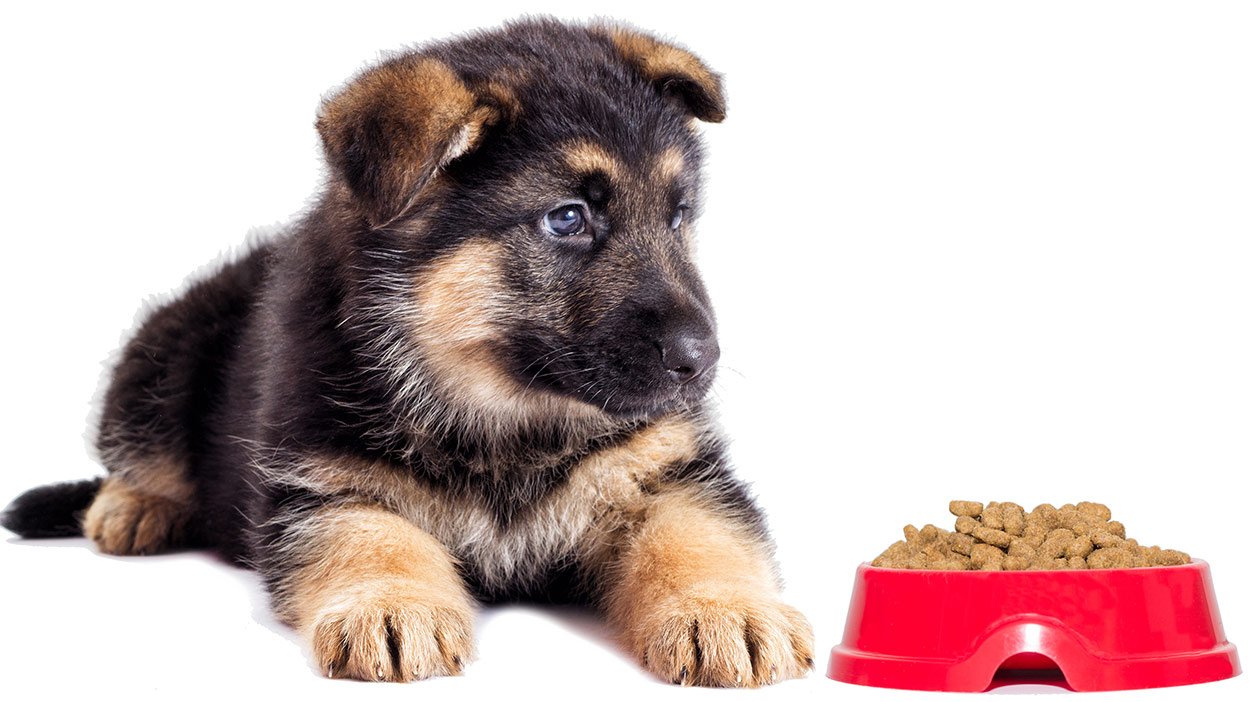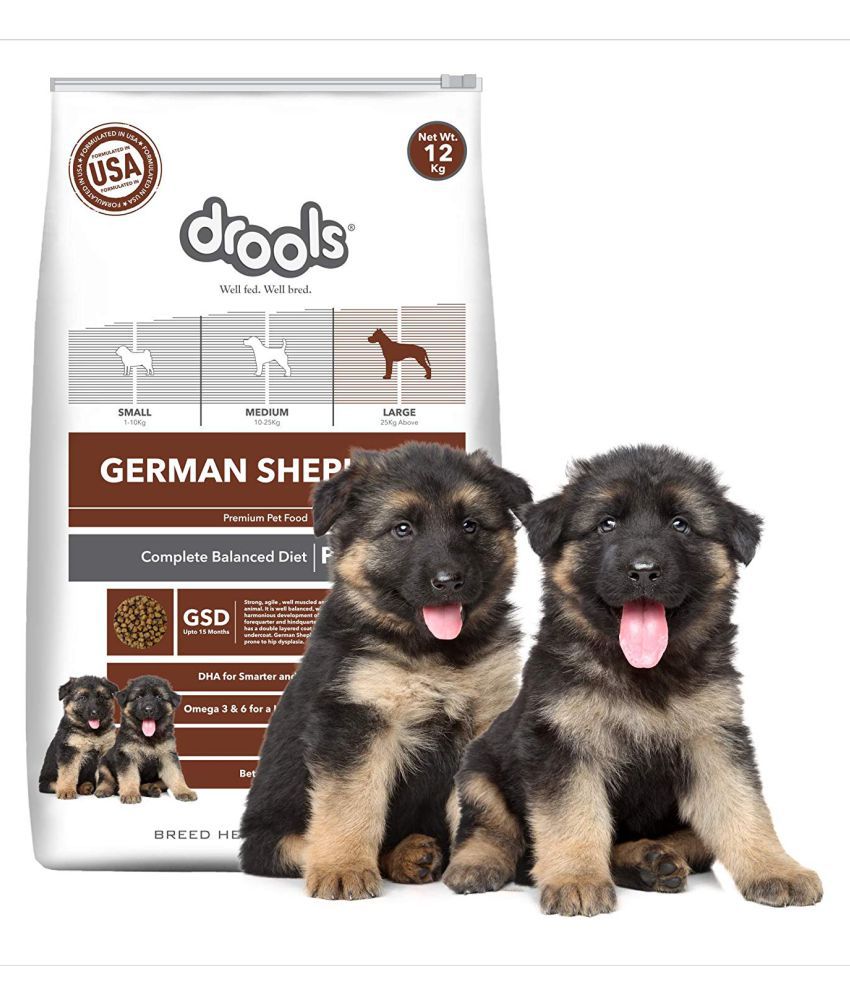German Shepherd Puppy Diet: Newborn
For a German Shepherd puppy to develop and grow properly, it is imperative that they first nurse on their mother’s milk. The first milk they receive is a protein and antibody-rich type of milk known as colostrum. This gives the puppy’s immune and central nervous systems a boost. They then progress on to regular breast milk.
Puppies will nurse for at least 6 to 8 weeks, gradually being weaned on to solid food at about 4 weeks. We cannot overemphasize the importance of a puppys first milk, as it provides them with 90% of its natural defenses. In addition, a puppys first feeding contributes to proper blood flow and helps oxygenate the puppy’s organs.
If, for any reason, the puppy cannot suckle its mother, don’t give them cow or goat milk. These milks are very poor quality in comparison to a puppy’s mother’s milk. If your German shepherd puppy has to be prematurely weaned, a veterinarian will be able to prescribe specific infant formula and establish the appropriate dosage for your puppy.
A dogs breed type does however influence this feed. For example, a Chihuahua and a German Shepherd should not be fed the same food. This is because hese breeds have different nutritional needs. Take a look here to find out more about the diet for a prematurely weaned puppy.
What Type Of Gsd Puppy Food To Feed
There are four types of puppy food: dry kibble, wet food, homemade food, and raw food.
Because puppyhood is a very brief period of time less than one year of your dogs life! and feeding complete and balanced nutrition is simply vital for adult health, most owners opt for commercial dry kibble that is nutritionally complete and balanced with wet food supplementation as needed.
Homemade dog food can be really challenging to make in a way that ensures it is complete and balanced nutritionally.
In most cases, you will need to work closely with your dogs veterinarian to add in additional vitamins and minerals for full and complete daily nutrition.
German Shepherd Puppy Feeding Guide: 12 Weeks To 6 Months
After approximately 12 weeks of age, puppies can be trained to eat fewer meals a day, at set times, and with set amounts. While you still dont want to limit their food too much at this age, its also not a good idea to just let them pig out whenever they want.
Large breed puppies have a tendency to overeat, and concerned puppy parents often give in to their pups cries for more. This sets your German Shepherd up for obesity, heart problems, liver issues, joint pain, and a host of other medical conditions.
Instead of letting your puppy have a free-for-all on a bag of kibble, ask your vet what they recommend. Theyll look at your German Shepherd puppy as an individual as well as considering the breed as a whole.
The vet will also consider the pups overall health, activity level, and metabolism.
While your vets recommendation should overrule anything you read online, here is a decent middle ground feeding guide for most German Shepherd puppies.
This potbelly baby stage means she is not quite mature enough for reduced feedings.
Watch her body composition, shape, and weight. When she starts to look more like an older puppy and the potbelly is slimming down, you can reduce the feedings to 3 per day.
Recommended Reading: Do German Shepherds Like Swimming
Best Foods For Adult German Shepherds
Just like our puppy food recommendations above, the below choices for your adult German Shepherd are based on natural dry food ingredients, with the best overall nutritional content that follows the AAFCO guidelines.
Your Adult German Shepherd will need a higher calorie count than they did as a puppy, but the food shouldnt be as nutrient-dense. If you continue the puppy formula as an adult, youll be likely to have an overweight pup on your hand. As your Adult graduates, below are some of our favorite foods for your German Shepherd Adult.
When And How To Change The Feeding Of Puppy To Adult

Many owners would like to know what is the best age to switch their German Shepherd puppy to adult food. The best way to shift your German Shepherd from puppy food to adult dog food is to look at his age and size.
When a German Shepherd is around 1 to 1.5 years old, he is generally considered an adult. This is a good estimate of when you could consider making the switch.
When a German Shepard has attained around 80-90% of their overall growth, is a good indicator of when the switch should be made.
It is always better to do this gradually as an abrupt switch may not be ideal. If you feed your dog twice per day, you can start giving him adult food mixed in with his usual food.
Also Check: Dogo Argentino Vs Pitbull Who Would Win
Raw Diet For German Shepherd Puppy
A German Shepherd puppy raw diet plan is not the same as an adult GSD.
Puppies need to eat more protein, fat, calcium, and phosphorus than adult dogs. So, feed puppies 15% bone and less than 20% fat to ensure they get enough nutrients and minerals. Raw food for German Shepherd puppies should include a balance of proteins, carbohydrates, fats, minerals, water, and vitamins per AAFCO guidelines.
For proper growth and development, it is not advised to skip meals while your puppy is growing and developing.
Change Of Food And Change Of Amount
How much to feed a German Shepherd puppy may also change based on when you begin the transition from puppy food to adult dog food.
If you choose to keep your GSD puppy on puppy food for longer, you may want to slightly decrease portion sizes per meal as your puppy grows up.
Conversely, if you switch your puppy over to adult food earlier, you may want to slightly increase portion sizes.
Discuss this with your veterinarian if you are unsure which approach is best for your puppys health.
Read Also: German Shepherd Face Outline
German Shepherd Raw Diet
Like homemade diets, formulating a raw diet for German Shepherds requires lots of effort and planning. There is more risk of contamination and nutritional imbalance due to its raw nature.
Raw dog food usually consists of uncooked and unprocessed animal-based products. These include raw meat, bones, vegetables, fruits, eggs with shells , dairy products such as butter and cheese made from raw milk without pasteurization or homogenizing. A raw dog diet is supposed to resemble the diet of what dogs ate in the wild millions of years ago.
Raw dog food is a growing trend These diets provide canines with more nutrients than cooked foods and help them protect their teeth, coat, digestive functions, among other health benefits. Read our German Shepherd Raw Diet Guide to learn all about raw feeding GSDs and their benefits. We also recommend visiting our best raw dog food article to find the best brands to feed your dog.
What To Feed My German Shepherd Puppy
German Shepherds are big dogs, and they have a hearty appetite. Although dogs are not obligate carnivores by nature, they thrive on a protein-rich diet. Ideally, most of the protein you feed your GSD will come from animal and meat sources rather than plant sources. Feed a minimum of 22% protein, although we would aim for 25% protein at the very least.
Recommended Reading: How Do I Train My German Shepherd
What Are The Nutritional Needs Of A German Shepherd Puppy
German Shepherd is a large dog breed. They tend to grow very fast from the newborn stage to adult puppy. In order for them to grow physically and mentally healthy and alert, their food should be well-balanced with the right amount of nutrients.
Protein
Since GSDs are carnivores, they need food rich in protein. They need 22% of protein in their diet for healthy tissue production, organ growth, and energy.
Essential Fatty Acids
GSD puppies need 8% of fats in their diet. The essential fatty acids aid in food digestion while it improves skin and fur condition. It also encourages healthy bones and joints development.
Carbohydrates
GSDs are active, hence they need around 5 to 8 percent of carbohydrates in their diet.
Vitamins and Minerals
GSDs are prone to Hip Dysplasia, having the right amount of calcium and phosphorus in their diet can help reduce their risk. Vitamins and minerals will also help build their immune system.
Recommended Supplements For German Shepherds
Here are the best breed-specific supplements GSDs may benefit.
- Hip & Joint German Shepherds are prone to bone and joint problems like osteoarthritis. To prevent or alleviate these problems, its wise to supplement their diet with Glucosamine and Chondroitin to help maintain an active lifestyle and support joint tissue. Finn Hip & Joint is an excellent choice.
- Digestive health Giving dog probitoics can help with issues like Inflammatory Bowel Disease and EPI, both wich are commong in this breed. It can also help reduce your dogs inflammatory responses to food allergens.
- Immnune system GSDs are more susceptible to cancers than most dogs, particularly as they get older. Adding dog immnue system supplementation may help boost your dogs defenses. Cannabidiol products like CBD for dogs has also show to can anti-cancinorgnic properties and boost immune health.
Because of the risk of bloating in GSDs, you should avoid raised dog bowls, make sure to give small, frequent meals, invest in a slow-feeder, and avoid vigorous exercise after meals.
Always consult with your vet before making any changes to your dogs diet. We suggest consulting a veterinary nutritionistto help create a diet plan for your GSD. Formulating a completely balanced diet without professional help can be tedious for some dog parents.
You May Like: Worst Dog Food For German Shepherd
You Can Give Your Dog A Bone
Bones can be a great supplement to a GSD puppys diet. They are high in minerals and other nutrients that will help to satisfy your puppys appetite.
Chewing on a bone also helps to stimulate saliva enzymes and to prevent the buildup of plaque which also helps to prevent gum disease. Also, bones, in essence, keep your dog constructively occupied.
It is, however, critical to make sure that you are giving your dog the right kind of bone to chew on, as the wrong kind of bone can pose a serious danger to its health.
I recommend always using raw meat bones for your dog. This is because cooked bones not only lack the nutrients of raw bones because they have mostly been cooked away, but they tend to splinter easily when chewed on and can easily stick into your dogs mouth, throat, or even its intestines.
Make sure that when you give your dog a bone that the size of it is appropriate to the size of your dog. The bone should always be larger than the length of your dogs mouth. This will prevent your dog from swallowing it this happens more than you may think.
Year Old German Shepherd

At 1 year old, youll begin to notice that your dog is actually eating less food than they did when they were younger. This is because their metabolism is beginning to slow down.
You can begin to limit the amount of times you feed them to once a day. If they leave food in their bowl, you can cut back on the amount youre actually giving them. We recommend Royal Canin Nutrition GIANT formula for large breed dogs.
You May Like: What Age Do German Shepherds Calm Down
Hills Science Diet Puppy Dog Food
Provide your German Shepherd puppy with the proper nutrition they need for a healthy lifestyle by feeding them the Hills Science Dry Dog food.
This dry food is formulated with wholesome ingredients like chicken meal and oats to meet the nutritional needs of your growing puppy.
This formula is manufactured in the United States following the industry standards and each ingredient meets the nutrient content and purity requirements.
The Hills Science Diet Puppy food is the best dog food for German Shepherd puppy who will be more than 55 pounds when they are an adult and is less than 1 year old.
Hills conduct quality system audits annually in their manufacturing facilities to ensure that the ingredients used in this formula are high in quality and standards.
The company also conducts safety checks to ensure that the food is safe for your German Shepherd puppy.
The Hills Science Dry food has a rich aroma and different textures to ensure that mealtimes are irresistible for your puppy. It also features controlled calcium levels, chondroitin, Glucosamine, antioxidants, and a blend of Vitamin C and E.
Pros
- Supports the optimal growth of your puppys bones.
- Supports healthy joints and strong muscles.
- Helps to maintain a healthy immune system.
- No artificial flavors, colors, or preservatives.
Cons
- Foul smell in some batches.
Blue Buffalo Natural Puppy Formula
- Real chicken is the first ingredient.
- Contains no by-product meals.
Blue Buffalo created this puppy food with the finest natural protein ingredients to promote strong muscle growth, and it is 100% grain-free for German Shepherd puppies who suffer with grain allergies.
This formula also includes fatty acids such as DHA and ARA, which are also found in his mothers milk, which supports cognitive development and eye health. Its ingredients also include Taurine and L-carnitine, which support cardiac health.
We love that Blue Buffalo has infused this kibble with their own Lifesource Bits that not only add extra vitamins, minerals and antioxidants which are great for your puppys health, but they are packed full of flavor too!
Recommended Reading: Why Are German Shepherds So Vocal
Supplements For German Shepherds
The vast majority of commercially available dry kibble is complete and balanced for your dog, assuming its a high-quality food.
That means there is almost never a reason to supplement your dogs diet with additives, vitamins, or herbal supplements. In fact, adding these things to a healthy dogs diet can cause a lot of harm.
Never supplement your dogs diet unless directed by a veterinarian. In those cases, they will prescribe or suggest canine-safe products to cover your GSDs special needs.
Human supplements are often unregulated, minimally effective, and often contain substances harmful to animals. Never use a human supplement for your German Shepherd.
Turkey Rice And Veggie Mix
Delicious wholehearted food low-fat recipe for German Shepherd who may want to maintain a healthy weight. It provides a good balance of lean animal protein, healthy carbs, and veggies.
Ingredients
- 1/2 diced apple
- 1 teaspoon parsley
- 1 tablespoon olive oil
Directions
Read Also: Raw Food Diet For German Shepherds
When Should You Stop Feeding Your German Shepherd Puppy Food
Puppies can begin adult kibble when they are approximately 80 percent of their adult weight. This usually occurs around 8 to 10 months of age, but you can safely feed puppy food up to one year old as long as they are not putting on excess weight. German Shepherds usually dont reach their full growth until 18 months of age.
It isnt harmful to keep a German Shepherd on puppy formula until their growth plates have fused over, which is generally around 12 to 18 months of age .
How Do I Know My Dog Is Getting The Right Amount
Amanda J. Hawthorne encourages feeding your dog according to the manufacturers nutritional guidelines. These guidelines may vary depending on the brand and formulation.
Make sure your dog keeps a healthy weight. The spine, ribs, and pelvic bones should be easy to lightly feel. All GSDs should have a visible waistline.
If the food your puppy is eating seems to be leaving them unsatisfied or they do not appear to be gaining healthy weight levels, you may need to consider following up with your veterinarian.
Recommended Reading: German Shepherd Smart
How And When To Switch From Puppy To Adult Dog Food
A German Shepherds diet can be changed after 12 to 15 months of age depends on the conditions, or as advised by your vet based on their growth and development.
You should constantly monitor the growth of your pet and make diet changes accordingly.
Your puppys food and drink containers should always be clean. Hygiene is very important to prevent the appearance of insects.
If there are insects in your dogs water, it could cause your German Shepherd puppy to suffer from intestinal parasites.
In addition to the German Shepherd puppy feeding diet, dont forget the importance of preventative medicines, following the appropriate vaccination schedules, and general German Shepherd dog care.
- Tags
German Shepherd Puppies’ Dietary Needs

Curious, confident, courageous, and vastly cuddly, these canines will gladly risk their lives to save yours. But, German shepherds usually need proper care and attention as they undergo drastic growth in the initial year of their life. Any neglect of nutritional needs results in serious health complications in their adulthood.
To begin with, you have to understand that GSDs are a large breed of dogs. So, it would be best if you gave them a large breed formula. You see, GSDs need extra minerals, vitamins, carbohydrates, and calcium. These nutrients support a healthy joint structure, promote buccal growth and a shiny coat. They also need a higher calorie intake as they tend to burn off the energy quickly. The German shepherd puppy sprouts super fast in the first eight months of their lives. That is when they need you to give them extra TLC.
On average, the GSD puppy requires 500 calories a day. And, by the time the puppy is 15 months, it needs 1600 calories. The protein intake should be around 18% to 22%. Moreover, there should be about 8-12% fat content in the diet to sustain the growth of your doggy.
Also Check: What Colors Are German Shepherds